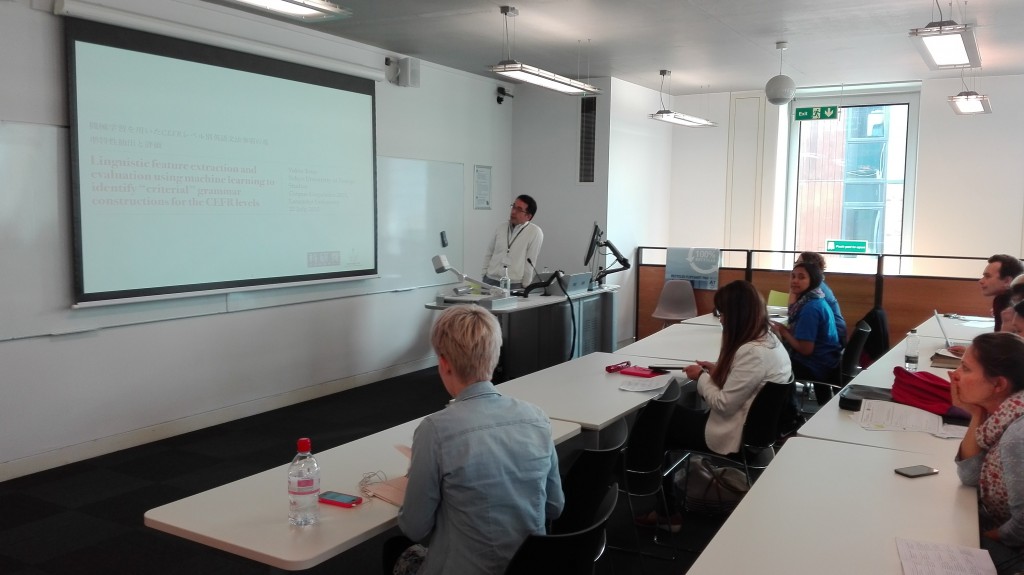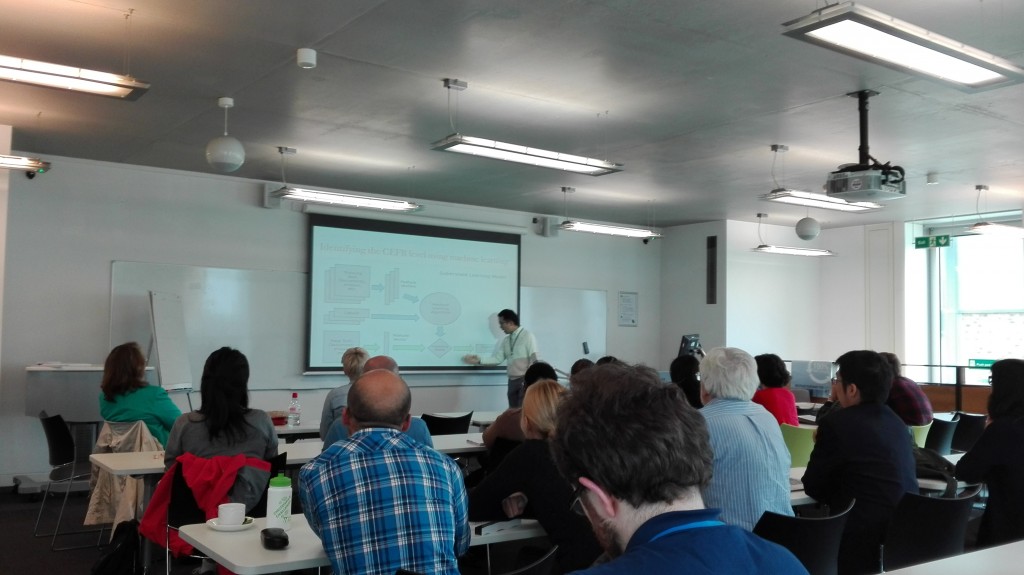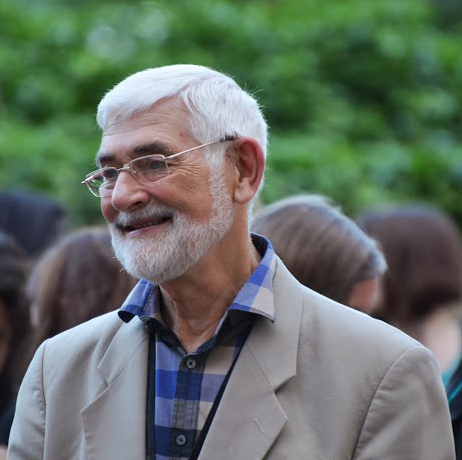Through the AESLA mail list
:::::::::::::::::::::::::::::::::::::::

Workshop on Future and Emerging Trends in Language Technologies
Universidad de Sevilla, 19-20 November 2015
http://www.glc.us.es/fetlt2015/
The Workshop ‘Future and Emerging Trends in Language Technology‘ has been conceived as a meeting point where experts and professionals in the fields of language technologies and other converging areas will discuss the state of the art, as well as the emerging trends in this sector. The main objective of this workshop is to serve as a bridge between academia and industry, as well as representatives of agencies that coordinate research and innovation policies. The workshop thus guarantees a multidisciplinary identical spirit in which experts will be able to present and analyze the trends that will shape the immediate future in this sector.
Following this approach, the organization of the workshop welcomes the reception of papers under the following categories:
NEW APPLICATIONS OF KEY CONSOLIDATED APPROACHES: Authors can submit their paper on new strategies, models and consolidated techniques at the academic or industrial level that are being used right now to tackle any issue in the field of Language Technology. Papers under this category must provide a brief explanation of the foundations of the approaches proposed and the areas and applications for which those techniques are useful in the present.
EMERGING RESEARCH: Authors can submit their paper under this category when they have preliminary results obtained from ongoing research projects. Papers must describe the motivation of the approach, as well as the scientific, methodological and/or technological approach chosen. Papers must also analyze the advantages and benefits derived from such approaches for a broad application in the field of Language Technology.
CHALLENGE PAPERS: Authors can submit a paper on different fields and convergent areas related to Language Technology describing the occurrence of new and constant challenges for both the academic and the industrial areas. These papers must indicate which areas and specific problems are currently posing a concrete technological and/or methodological challenge. Papers under this category must include the reasons why present-day techniques should be considered insufficient to tackle the issues at hand by the presentation of preliminary research/development results as a justification. Additionally, articles in this section should propose research strategies that can be considered promising to provide sound solutions to the problems defined, with a sound and clear scientific and technical argumentation.
—————————————————————
LIST OF TOPICS
—————————————————————
Topics should be related to any area of Speech Technology, including those studies that can be considered coming from convergent areas or even industrial applications.
Topics of interest include, but are not restricted to:
Core areas of interest
A.1) Speech recognition:
Speech assistants, Voice search
A.2) Information retrieval,
Information extraction and Text mining
Topic spotting and classification
Entity extraction
Spoken document retrieval
A.3) Semantics and Ontologies
A.4) Dialog Modelling and Management
Open domains, Incrementality, Statistical DM,
Hybrid models, World knowledge, Metacognition
A.5) Machine Translation
Fully-automated MT services in Global Business and
Government Services
Speech-to-speech MT
A.6) Development Frameworks
A.7) Multimodality
A.8) Multilinguality
A.9) Mathematical foundations
A.10) Language resources and Evaluation
Multilingual resources
Metadata, annotation, tools
Convergent areas of interest:
B.1) Mobile Devices
B.2) Robotics and Vision
B.3) Machine Learning
B.4) Games & Social Networks
B.5) Brain-computer Interfaces
B.6) Technology background: Mobile, Cloud,
Social Media, and Big Data
B.7) The Internet of Things (IoT)
Industrial areas of interest:
Integration of state-of-the-art LT in support of multilingual global business applications:
C.1) Speech-to-Speech Translation
C.2) Cross-lingual Information Retrieval
C.3) Multilingual global marketing
C.4) Sentiment analysis
Applications to industrial sectors
C.5) Healthcare and BioMedicine NLP
C.6) Social Media
C.7) Smart Cities
C.8) Opinion mining
C.9) Public Administration
C.10) Instruction & Teaching
C.11) Communications
LT in the Web World
C.12) Crowdsourcing for LT
—————————————————————
IMPORTANT DATES
—————————————————————
Paper submission deadline 25th July 2015
Acceptance notification 15th September 2015
Paper final version submission 1st October 2015
Early Registration Deadline 1st October 2015
Workshop dates 19th – 20th November 2015
—————————————————————
LOCATION
—————————————————————
FETLT-2015 will be held at the University of Seville, Spain.
For more information, please visit: http://www.glc.us.es/fetlt2015/
—————————————————————
SUBMISSION PROCEDURE
—————————————————————
Authors are invited to submit non-anonymized papers in English presenting original and unpublished research, not currently submitted elsewhere.
Regular papers should not exceed 12 single-spaced pages (including eventual appendices) and should be formatted according to the standard format for Springer Verlag LNCS series (see http://www.springer.com/computer/lncs?SGWID=0-164-6-793341-0).
Files must be sent via https://www.easychair.org/conferences/?conf=fetlt2015
Papers submitted must identify the category as well as up to 3 of the main topics aforementioned.
—————————————————————
INVITED SPEAKERS
—————————————————————
Nuria Bel (University Pompeu Fabra)
Asunción Gómez, Polytechnic University of Madrid
Sebastian Moeller, TU Berlin, Telekomm
Steve Renals, University of Edinburg
Giuseppe Riccardi, University of Trento
Pierre-Paul Sondag, European Commission
Steve Young, University of Cambridge
PROGRAM COMMITTEE AND ADVISORY GROUP
Alex Acero (Apple)
Roberto Basili (University of Rome)
Nuria Bel (University Pompeu Fabra)
Johan Bos (University of Groningen)
Nicoletta Calzolari (CNR-ILC)
Khalid Choukri (ELDA)
Walter Daelemans (University of Antwerp)
Thierry Declerck (DFKI)
Marc Dymetman (Xerox Research Centre Europe)
Antonio Ferrandez (University of Alicante)
Ana GarcÃa-Serrano (UNED)
Jesús Giménez (Nuance Communications)
Xavier Gómez-Guinovart (University of Vigo)
Gregory Grefenstette (Inria)
Veronique Hoste (University of Ghent)
Eduard Hovy (Carnegie Mellon University)
Rebecca Jonson (Artificial Solutions)
Alon Lavie (Carnegie Mellon University)
Ramón López-Cózar (University of Granada
Teresa López-Soto (University of Seville)
Roberto Manione (AlliumTech)
Daniel Marcu (USC)
Joseph Mariani (LIMSI-CNRS and IMMI)
Patricio Martínez-Barco (University of Alicante)
Ruslan Mitkov (University of Wolverhampton)
Antonio Moreno-Sandoval (Autonomous University of Madrid)
Sergei Nirenburg (Rensselaer Poytechnic Institute)
Mirko Plitt (Modula Language Automation)
Massimo Poesio (University of Essex; U. of Trento)
Andrei Popescu-Belis (Idiap Research Institute)
Jose F. Quesada (University of Seville)
Manny Rayner (University of Geneva)
Steve Renals (University of Edinburg)
Giuseppe Riccardi (University of Trento)
Francisco J. Salguero (University of Seville)
Kepa Sarasola (University of the Basque Country)
Javier Sastre (Ateknea Solutions)
Marc Steedman (University of Edinburgh)
David Suendermann-Oeft (ETS)
Khiet Truong (University of Twente)
Alfonso Ureña (University of Jaen)
Jason D. Williams (Microsoft Research)
PROGRAM CHAIR
Jose F Quesada, University of Seville
ORGANIZING COMMITTEE
Joaquín Borrego-Díaz (University of Seville)
Juan Galán-Páez (University of Seville)
Diego Jiménez (University of Seville)
Teresa López-Soto (University of Seville)
Francisco J. Martín-Mateos (University of Seville)
Ángel Nepomuceno (University of Seville)
José F. Quesada (University of Seville)
Francisco J. Salguero (University of Seville)




